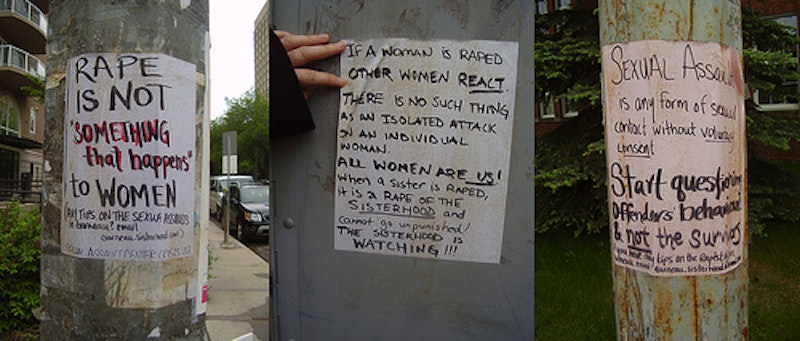In every village, camp, road and almost every home, a plague is stealing and destroying women. War, chaos and carnage have so warped society that rape is everywhere. Attacks are vicious and unrelenting.
This is how journalist Jonathon Pearlman describes the state of the Democratic Republic of Congo, a nation rent by endless civil war, unthinkable human rights abuses and ubiquitous rape. In a recent issue of The Sydney Morning Herald, Australia’s major daily, Pearlman tells the stories of several Congolese women, all of whom were raped by members of various Congolese militias. Their stories are horrifying, almost too gruesome to read.
These women are just a few of the millions of Congolese women who have suffered this fate. Rape, as each of these women tells Pearlman, is a daily reality in the DRC. At a rural Doctors Without Borders clinic, the head nurse tells Pearlman that, “Sexual violence has become banal. It is so common. It happens to everyone… Almost everyone in the village has been raped. The women find it almost normal.”
Last summer, the United Nations officially declared rape a weapon of war, and when one looks at the situation in the DRC, there can be no doubt that it is a highly effective one. Rape leaves entire villages physically and psychologically devastated. Women rarely have access to the medical care they need to recover physically or psychologically. Many will die from related infections, or from resulting pregnancies. Others are denounced by their husbands and families. One of the women Pearlman spoke to regrets surviving her rape at all.
It sounds like a living hell, a dreadful but distant nightmare. And yet, as far as rape goes, the DRC is not so far a cry from the United States. Even here, in a supposedly “unwarped” society, rape is a daily reality for women. American women might not face the terror of civil war or the ubiquity of rape that confronts the women of the DRC, but the Rape, Abuse and Incest National Network (RAINN), estimates that one in six American women will be sexually assaulted in their lifetime. Again, this is half of the number of Congolese who have been raped, but even so, it is an unforgivably high number. While American women don’t experience rape as the kind of large scale, coordinated effort we’re seeing in the DRC, many live with, or in fear of, rape, every day. With one sexual assault occurring every two minutes, Americans can’t be complacent about rape.
It’s easy to think that rape doesn’t happen all that often in America. After all, American women have made huge advances in the last few decades. And it’s not like you know anyone who’s been raped. And isn’t rape a matter of personal pathology, just a handful of screwed up guys who get off on hurting women? If only.
Rape happens often in America: about 248,300 times a year. With those odds, you might not have been raped, but chances are that you know someone who has, whether they’ve told you about it or not. Today, rapes are more likely than ever to be reported to the police, but 60 percent of them go unreported, and only a tiny fraction of those rapes will result in a conviction. Given those statistics, one might wonder whether the United States is really as advanced as we like to think.
In the DRC, rape is used as a weapon, meant to demoralize and devastate entire villages. It’s not about sex; it’s about power. In the same way, rape in America is designed to silence women, to scare them, to control them. It’s not about sex; it’s about putting women in their place. On a smaller and less devastating scale, sexual harassment—in the workplace or on the street—is a way of reminding us that no matter how many glass ceilings we break, no matter how many female CEOs there are, women are still vulnerable.
When you’re a woman, even in an “advanced” society like the US, rape is always a threat. And without clear action from both men and women, that threat will continue to be a daily reality for American women. Unless we as a society demand better, unless more women are emboldened to report their rapes and to stand up to a justice system that is stacked against them, unless more men are prepared to condemn violence against women as cowardly and unacceptable, this epidemic will continue to spread. America needs bold action from men, women, legislators and law enforcers. Without it, this war will go on and this weapon will continue to be deployed. Without bold action, this society will become warped.

